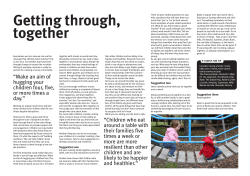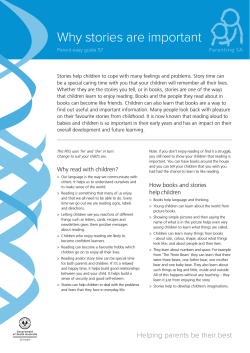
KIDS NEED TO FEEL HEARD. Sometimes it may be difficult... say. Other times it may be hard to get them...
How to listen actively to your children OTHER TITLES Create It Teaching your children to talk about their feelings How can I help my young child learn to get along with others? If you’re a parent, you’re a role model: How to teach your children by example Nurture It How can I teach my young child to deal with peer pressure? Teaching your children the truth about drugs and gambling How can I help my young child to be more confident? How to listen actively to your children Choose It How can I help my child if my partner is addicted? Helping your teen work through anger The truth about popular drugs How do I know if my teen is using drugs? How do I talk to my teenager about drugs? Raves and club drugs: How do I protect my kids? Get It Back Helping teens evaluate their drug use How bad is my teen’s drinking or drug use? Does your teen’s drug use leave you feeling like you’re losing your sanity? How to get through to your teen Intervening when your teen is using drugs Getting help for your son or daughter who is drinking, using other drugs or gambling Supporting your son or daughter in recovery KIDS NEED TO FEEL HEARD. Sometimes it may be difficult to hear what they have to say. Other times it may be hard to get them to talk about their thoughts at all. They may think you won’t understand. They may be afraid to share their feelings because they think someone may make fun of them. If you practise being open and honest with your children and make it easy for them to talk to you, you will build a stronger relationship with them. This process works in two ways: hearing what your children are saying and talking about your own thoughts and feelings with them. It can be tough to talk with your kids. Don’t give up! Here are some ideas that may help you. What are the basics? To get the whole picture, it is important to listen to both the spoken word and the unspoken feelings. For example, if your children say, “I hate my friends and never want to see them again,” the unspoken feelings might be hurt, loneliness or rejection. In this case, the underlying feelings tell you more than the words that were spoken. It is important not to assume that you know what those underlying feelings are. Try encouraging your children to tell you their feelings by saying, “You must be feeling sad to say that.” They may correct you and say that they are angry, but this will provide an opening to discuss their feelings. If you don’t understand what they are telling you, say it back to them in your own words to make sure you are clear. For example, if they say, “I don’t want to go to soccer practice anymore because I always feel stupid,” you could say, “So, you don’t enjoy soccer practice anymore because of the way the other kids treat you? Please tell me more about why you aren’t enjoying soccer anymore.” For you to have open communication, it is important to relate your feelings and concerns without judging what your child has said. In the above example, it might be easy to respond by saying, “Don’t be silly. This will blow over soon enough.” But take a moment to consider what you are really feeling. Worried? Confused? Sad? Try responding in a way that reflects those feelings. “I’m sorry that things are not going well with your friends and I am feeling confused about what went wrong. Please tell me more about that.” When you respond this way, your children are more likely to open up and tell you what’s going on. You may need to provide an opportunity for them to expand on what they tell you. Using phrases such as “Tell me more about that” can help them to keep talking. Spending time with them doing something you both enjoy can be a terrific opportunity to exchange thoughts and ideas. Discuss their interests and let them educate you about what they are passionate about. Talking is a two-way process. It can be hard to practise open communication with your kids. Especially if they are acting out. Sometimes your first reaction is to get frustrated or angry. Remember that many parents feel this way. You are not alone. Four ways to improve communication with your kids: 1. Ask open-ended questions, such as “Tell me about your day” or “What did you do today?” These allow your child to tell you about events. These questions also require more than a one-word answer. 2. Listen reflectively. You can do this by simply repeating what your children have said or by saying it back to them in your own words. This will make sure that you truly understand what your children are trying to tell you. 3. Affirm your child’s feelings. This makes children feel supported and will make it easier for them to talk to you in the future. An example of this would be: “I understand that it must have been hard for you to come to me about this. I really appreciate your openness.” 4. Summarize what you’ve heard. This reinforces what your children have said and shows that you have been listening to them. Also, keep in mind that there are non-verbal ways of communicating that can also help with open communication. Making eye contact and nodding your head while they are talking are effective ways of helping someone else feel heard. Putting it all together Now that you know what the basics are, there is a formula that might help you in talking with your child. First of all, describe the behaviour you are seeing (“When you say you hate your friends”) then describe how you feel (“I feel worried”) and finally describe the effect the behaviour has on you (“because I want you to be happy”). If you choose to use this method, use words that feel comfortable to you. It takes time Actively listening to your kids can take a lot of practice. Don’t give up. It might take a long time for some kids who are naturally reserved. You know your child and you know the line between prying and healthy curiosity. The rewards of open communication include identifying problems while they are small, preventing misunderstandings and getting to know your child as a person. Your kids need you to listen. Remember, you are very important in your child’s life. For more information We understand that everyone’s needs are different. Whether you want to prevent your child from using alcohol, tobacco or other drugs, or you want to help your child deal with a drug problem, we can help. Information and prevention programs, group and family counselling, outpatient and residential treatment, and the Protection of Children Abusing Drugs program are offered by Alberta Health Services and its funded services to help your child and your family. For more information and to find an addiction services office near you, please call the 24-hour Helpline at 1-866-332-2322. Activity Page ACTIVE LISTENING 1. Find at least one thing every day that you can affirm to your child. ·I really appreciate the way you... ·I was really impressed with the way you handled... 2. Try adding this exercise into your daily routine. ·Tell me about a good thing that happened to you today. ·Tell me about a not-so-good thing that happened to you today. 3. Have your child describe an event to you. Practise active listening by using the following phrases to reflect what your child is saying. It’s like being a mirror. The goal is to reflect back what was said without analyzing, judging or adding more. A mirror can only reflect back what is provided. It cannot offer an opinion! ·It’s like.... ·You feel... ·You mean... 4. Teach your child how to listen reflectively in order to understand what you are saying. Start with simple ideas and progress as your child learns the skills of active listening. Here are some ideas to get you started: ·Something I really like about you is... (use an example of a behaviour you appreciate, such as, “Something I really like about you is when you look out for your little sister by helping her cross the street or tie her shoes.” Now your child would reflect back what they have heard, “You mean you like it when I help my sister.”) ·My greatest wish for you is... ·Something that really scares me is... 5. Spend time with your child doing something they have chosen to do. Going for a walk through a mall together, taking the dog for a walk, or going for ice cream are all ways of encouraging conversation. For more information and to find an addiction services office near you, please call the 24-hour Helpline at 1-866-332-2322. © AHS 2009 501E ISBN 0-7785-2773-5
© Copyright 2025





















